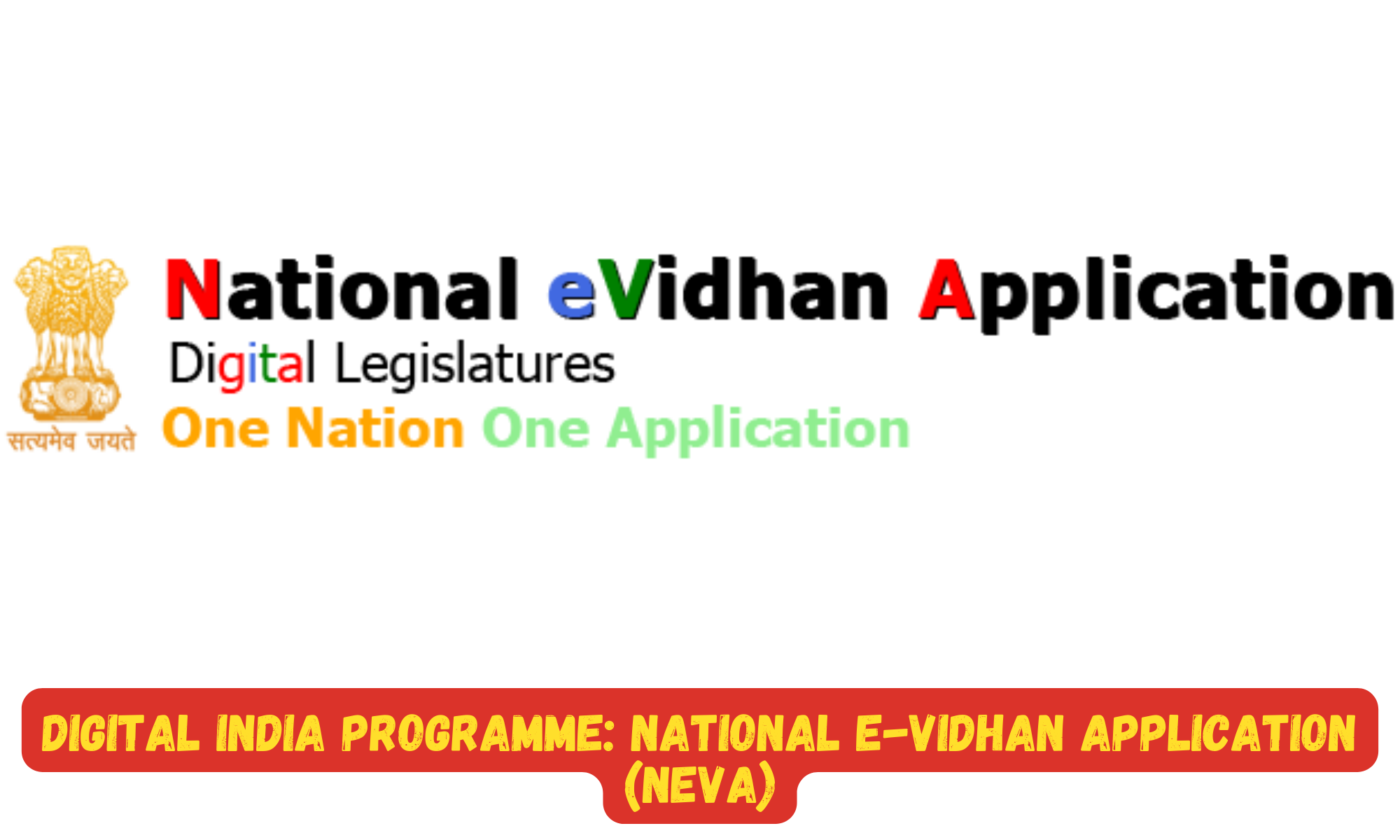Why in News?
The Ministry of Parliamentary Affairs is planning to host a two-day National Workshop on the National e-Vidhan Application (NeVA) on May 24th and 25th, 2023. The workshop will take place at the Convention Hall, The Hotel Ashok, in New Delhi. The main objective of this workshop is to promote the adoption of the NeVA platform by all State and Union Territory Legislatures. By utilizing technology, the aim is to bring transparency, accountability, and responsiveness to their legislative proceedings.
Buy Prime Test Series for all Banking, SSC, Insurance & other exams
NeVA is part of the “Digital India Programme” initiated by the Government of India and is classified as one of the 44 Mission Mode Projects (MMPs). Its purpose is to eliminate the need for paper-based operations in all State Legislatures, transforming them into digital entities. Currently, 21 State legislatures have signed a Memorandum of Understanding to implement NeVA.
Funding has been allocated for 17 Legislatures, and they have received the necessary funds to implement the project. Among them, 9 Legislatures have successfully transitioned to a fully digital and paperless system, operating entirely on the NeVA platform for all their legislative activities.
Introduction:
Understanding National e-Vidhan Application (NeVA):
The National e-Vidhan Application (NeVA) is a centralized web-based application that digitizes the functioning of state legislatures in India. It aims to facilitate paperless proceedings, promote transparency, and streamline legislative processes. NeVA acts as a one-stop solution for lawmakers, enabling them to access various legislative documents, participate in discussions, and efficiently manage legislative operations.
National e-Vidhan Application (NeVA): Features and Functionality
NeVA offers a range of features that enhance the efficiency and transparency of legislative processes:
a. Document Management System: NeVA provides a secure and centralized repository for storing and managing legislative documents such as bills, reports, proceedings, and committee reports. This digital platform eliminates the need for physical copies, reducing paperwork and associated costs.
b. e-Notices and e-Tablets: NeVA enables the issuance of e-notices to legislators regarding upcoming events, sessions, and committee meetings. It also provides e-tablets to lawmakers, replacing traditional paper-based documentation. This digital transition improves accessibility and convenience.
c. Electronic Voting System: The application includes an electronic voting system that allows legislators to cast their votes electronically during debates, discussions, and voting sessions. This feature eliminates manual counting, reducing the possibility of errors and enhancing the efficiency of decision-making.
d. Real-time Information Dissemination: NeVA ensures real-time dissemination of information, making legislative proceedings accessible to the public. It offers live streaming of sessions, committee meetings, and events, fostering transparency and increasing citizen engagement in the democratic process.
Benefits of National e-Vidhan Application (NeVA)
The implementation of NeVA brings numerous advantages to the legislative ecosystem in India:
a. Improved Efficiency: NeVA streamlines legislative processes, reducing paperwork, and automating several tasks. It enables lawmakers to access and manage documents digitally, saving time and enhancing overall efficiency.
b. Enhanced Transparency: NeVA promotes transparency by providing citizens with easy access to legislative proceedings. The live streaming feature allows citizens to witness debates and discussions, fostering accountability and trust in the democratic process.
c. Cost and Resource Optimization: NeVA significantly reduces the costs associated with printing, distribution, and storage of physical documents. The digital platform also minimizes the need for physical infrastructure, making it an environmentally friendly and cost-effective solution.
d. Seamless Collaboration: NeVA facilitates seamless collaboration among legislators, enabling them to work together on documents, share insights, and exchange ideas. This feature encourages effective decision-making and promotes a participatory legislative process.
NeVA: Successful Implementation and Expansion
The implementation of NeVA has witnessed success in several states across India. As of now, 15 state legislatures have adopted the application, and efforts are underway to encourage its adoption in all state legislatures. The success of NeVA has paved the way for digital transformation in the legislative domain, establishing it as a crucial pillar of the Digital India Programme.
Beneficiaries of NeVA:
Following are the benficiaries of National e-Vidhan Application (NeVA):
- Lawmakers: NeVA provides lawmakers with a powerful platform to digitize the entire legislative process, including drafting bills, submitting questions, and accessing relevant information. It offers a centralized repository of legislative documents, enabling easy search and retrieval. Lawmakers can access the application from any location, which enhances their efficiency and promotes better legislative decision-making.
- Legislative Staff: NeVA streamlines the administrative tasks of legislative staff, simplifying document management, agenda preparation, and communication. It reduces the dependency on physical files and enables seamless collaboration among different departments. The application also facilitates the tracking of the progress of bills, committees, and resolutions.
- Citizens: NeVA promotes transparency and citizen participation in the legislative process. It allows citizens to access legislative documents, view live webcasts of proceedings, and track the activities of their elected representatives. By enabling public access to information, NeVA strengthens democratic governance and empowers citizens to hold their representatives accountable.
Drawbacks of NeVA:
- Infrastructure Challenges: One of the primary drawbacks of implementing NeVA is the requirement for robust and reliable internet connectivity across the country. In rural and remote areas, where internet penetration is relatively low, accessing and utilizing the application becomes a challenge. Addressing this infrastructure gap is crucial to ensure equitable access to NeVA’s benefits.
- Digital Literacy: The successful implementation of NeVA hinges on the digital literacy of lawmakers, legislative staff, and citizens. In a diverse country like India, where technological proficiency varies, ensuring that all stakeholders are adequately trained to effectively utilize the application is essential. Providing comprehensive training programs and ongoing support is necessary to bridge the digital divide.
- Data Security and Privacy: As NeVA deals with sensitive legislative information, ensuring robust data security measures and safeguarding privacy is of utmost importance. Any breach in the system could have severe consequences, undermining the trust in the digital platform. Stringent protocols must be in place to protect the data and privacy of all users.
Funding of NeVA:
The funding for NeVA is primarily sourced through the Digital India Programme, which is supported by the Government of India. The initiative involves collaboration between the central and state governments, with the central government providing financial assistance to the states for the implementation and maintenance of NeVA. The allocation of funds takes into account the infrastructure requirements, training programs, and ongoing support services. Additionally, public-private partnerships and collaborations with technology firms are encouraged to leverage expertise and resources.
National e-Vidhan Application (NeVA): Vision
The National e-Vidhan Application (NeVA) stands as a testament to India’s commitment to digital transformation and efficient governance. By leveraging the power of technology, NeVA brings transparency, efficiency, and accessibility to legislative processes. As NeVA continues to expand its reach across the country, it strengthens the vision of a Digital India, ensuring that the nation’s governance evolves with the digital age.
Also Read:
- NEP SAARTHI and NEP 2020: A Transformative Vision for India’s Education System
- Unlocking Financial Freedom: An Insight into the Liberalized Remittance Scheme (LRS)
- Pradhan Mantri Matsya Sampada Yojana: Revolutionizing India’s Fisheries and Aquaculture Sector
- ‘75/25′ initiative for people with hypertension, diabetes launched




 Which District of Uttar Pradesh is known...
Which District of Uttar Pradesh is known...
 Which Mountain is known as the Stone Sen...
Which Mountain is known as the Stone Sen...
 Brazil Creates History! Lucas Pinheiro B...
Brazil Creates History! Lucas Pinheiro B...








